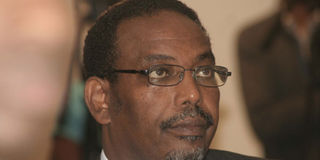Deputy Speaker Maalim rules out March poll

National Assembly Deputy Speaker Farah Maalim has said it is impossible to hold the next elections in March 4 next year September 14, 2012
What you need to know:
- Mr Maaalim cites delay in procuring Biometric Voter Registration kits, issuance of IDs as reasons why March 4, 2013 poll is impossible.
Deputy Speaker Farah Maalim has said it is impossible to hold the next elections in March 4 next year.
"I don’t see any way that we can have (the General) election in March next year. I’d have loved to have these elections in December myself.
"It’s not possible in December, it’s not possible in March next year, and I do not believe it will be possible to have elections anywhere before August next year,” said Mr Maalim.
‘We’re in a fix,” he said.
Speaking in an interview on K24’s TV Capital Talk show on Friday evening, Mr Maalim said the queries about the implementation of the two-thirds gender threshold in the Constitution; the delay in Parliament to approve the elections’ regulations, and the procurement of the Biometric voter registration equipment, show that the country is “in trouble” when it comes to having the polls as scheduled.
Mr Maalim added that the civic education for the voters, and the issuance of Identification Cards to all Kenyans above 18 years, to allow them to be registered as voters, means that the country will need more time than the five months left to the March 4 poll date.
“I don’t think we’ll be ready. We’ve not procured the BVR yet; the BVR is coming in later this month; we’re definitely going to have a pilot project for that; we’ve not issued identity cards yet. The amount of money set aside for registration of persons is very little. There are no resources.
"Fifty per cent of my constituency has not seen registration yet for the last four years. That’s going to take a few months, to ensure that every Kenyan is a registered voter. Because failing to do that is disenfranchising people,” said Mr Maalim.
Campaign mood
The Deputy Speaker said the campaign mood in the country, where “everybody wants to be President” has left Parliament with very few members to transact business.
He said it will be “difficult” to approve the amendment in the Constitution to help achieve the two-thirds threshold, because that requires 148 MPs, and raising those numbers with all eyes on the next General Election and the prevailing campaign mood is nigh impossible.
Mr Maalim said Kenya being a patriarchal society, meant that there was no way, “statistically” or “empirically” that the number of women who’ll make it to the House will meet the constitutional threshold to ensure that no more than two-thirds of the House are from the same gender.
“It is inconceivable, it is impossible and completely out of question for us to achieve that,” said Mr Maalim.
“Affirmative action is not implemented through provisions of the Constitution, yet we did that."
Mr Maalim noted that if the MPs do not settle on a mechanism to ensure that the provision is implemented, then, the courts will have no option but to declare the next Parliament as unconstitutional.
The Deputy Speaker said there “has to be a lot of discussion put into the issue”, because the mathematics of representation did not allow the country to have a bloated Parliament.
He said the US with 311 million people, had 435 representatives in the House of Representatives and 100 senators in the Congress; yet Kenya with just 38 million people will have 349 MPs to sit in the National Assembly and 67 people to sit in the Senate.
Mr Maalim said, in a worst-case scenario, where the number of women has to be topped up to fulfill the constitutional threshold, the country will have a bloated Parliament, which will be very difficult to maintain.
“Without an amendment to the Constitution itself on the issue of one-third, then we’re in trouble,” said Mr Maalim.




